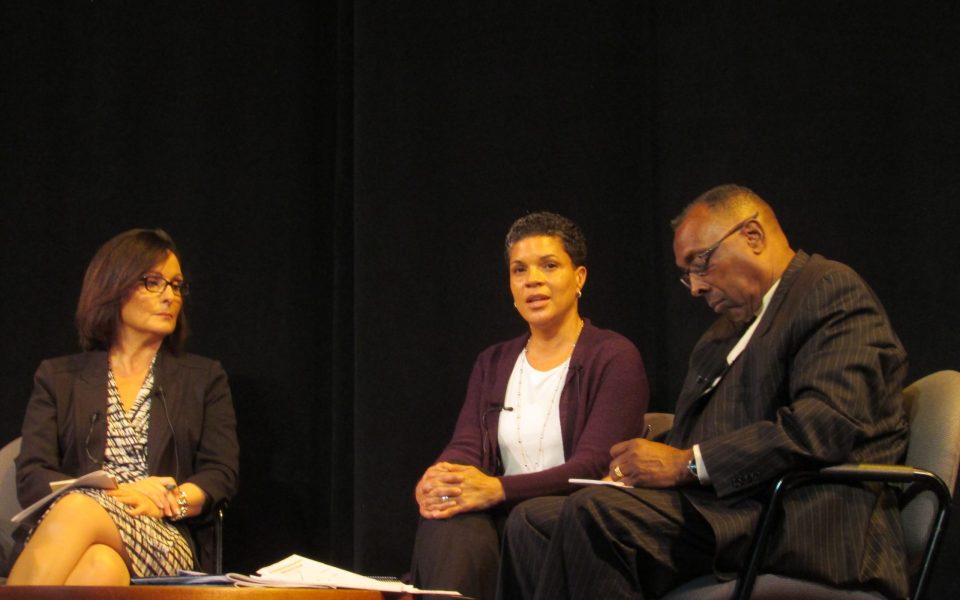It’s inimical to the journalistic enterprise of holding the powerful to account to say kind things about elected officials, but I like Greensboro Mayor Nancy Vaughan.
She takes chances and isn’t afraid to engage with constituents, and even admits on occasion when she makes the wrong call. But she’s not backing down on her stance against stockpiling bottled water in preparation for Hurricane Florence. With 28 comments, 88 retweets and 169 likes (and counting), this wise edict from Monday at 5:58 p.m. qualifies as a viral tweet for a mid-size city mayor: “If you are on city water there is no reason to buy bottled water. Our system is reliable and well prepared. It is designed to operate during and after the storm.”
Facing an onslaught of skepticism and scorn, she took delight in citing the Charlotte Observer’s editorial the next day, which both quoted her tweet and vindicated her position. The Durham Herald-Sun likewise researched the question and concluded that municipal water supplies are safe in a hurricane. (Most of the pushback boils down to a concern that flooding could cause contamination, and residents experiencing a power outage would be unable to boil water. City officials respond that water-treatment plants in the state’s three major metros are at a high enough altitude that they’re not going to flood, and they have backup generators to pump water wherever it needs to go if the power goes out.)
While Vaughan displays the modern politician’s skilled use of social media, she doesn’t shrink from IRL dialogue either. Her appearance on a live broadcast of North Carolina Public Radio’s “The State of Things” with Homeless Union of Greensboro organizer Marcus Hyde and Duke Law School professor Sara Sternberg Greene to talk about panhandling demonstrates that she’s not afraid to mix it up with smart people who may wield opinions different from hers. And this isn’t the first time Greensboro’s mayor has sat on a panel and hashed it out with people who might challenge her: She joined The New Jim Crow author Michelle Alexander onstage at the Carolina Theatre in 2016 after the New York Times rapped the Greensboro Police Department for racial profiling.
Progressives may not like every single one of Vaughan’s votes, but holding a perfect voting record by one group’s criteria is not really the standard of democratic governance, is it? We live in an era in which most politicians wield power by sticking to their corner and waging eternal war against their opponents, whether it’s Trump’s plurality of support triumphing over his divided enemies, or Phil Berger’s artificial majority through rigged legislative mapping. Vaughan’s politics rest not on the notion that she’s always right, but rather that by mixing it up with people who hold different viewpoints you tend to get a result that the largest number of people can live with.
Vaughan opened the segment on “The State of Things” on Tuesday by paying a compliment to Hyde, her sometime adversary.
“You know, I do want to give Marcus a lot of credit for this,” she said. “He really brought this [constitutional violation] to our attention, maybe in January or February of this year. And he came to city council and said that the laws had changed, and that according to the Supreme Court we could no longer have permits, and that we should review our ordinances. And we did away with the permitting almost immediately.”
You can accuse Vaughan of co-optation, but it’s a lot better than annihilation.
So, Nancy, go ahead and accept the compliment. Then forget I said it. (And by the way, Triad City Beat doesn’t make election endorsements, so if for some reason you decide to break your campaign pledge to not seek reelection in 2021, understand that this friendly note is non-transferrable.)
Join the First Amendment Society, a membership that goes directly to funding TCB‘s newsroom.
We believe that reporting can save the world.
The TCB First Amendment Society recognizes the vital role of a free, unfettered press with a bundling of local experiences designed to build community, and unique engagements with our newsroom that will help you understand, and shape, local journalism’s critical role in uplifting the people in our cities.
All revenue goes directly into the newsroom as reporters’ salaries and freelance commissions.


Leave a Reply